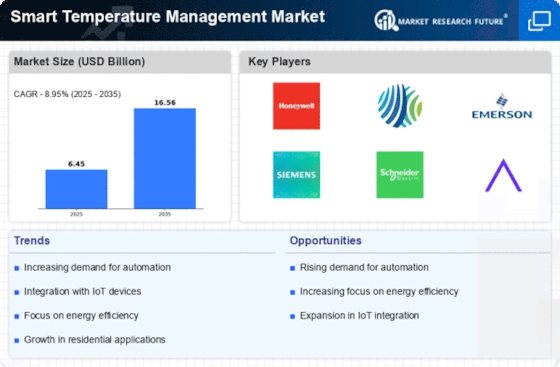Top Industry Leaders in the Smart Temperature Management Market

The Competitive Landscape of the Smart Temperature Management Market
The humble thermostat has traded in its analog dial for a symphony of sensors, algorithms, and connected convenience. The Smart Temperature Management (STM) market hums with the activity of diverse players vying to control the climate and optimize energy consumption in homes, buildings, and even industrial settings. Understanding the strategies at play, the factors driving market share, and the rising stars reshaping the industry is crucial for anyone navigating this dynamic landscape. Driven by factors like rising energy costs, increasing awareness of sustainability, and growing adoption of smart home technologies, the market is expected to exhibit sustained growth.
Key Player:
- HEATEX AB
- API Heat Transfer
- LORD Corporation
- AI Technology, Inc.
- LAIRD PLC
- Aavid Thermalloy, LLC
- Jaro Thermal
- Delta Electronics, Inc.
- Henkel AG & Co. KGaA
- Honeywell International Inc
Strategies Adopted by Market Leaders:
-
Technology Powerhouse: Giants like Honeywell, Johnson Controls, and Schneider Electric invest heavily in R&D, pushing the boundaries of STM technology. Integration with AI, machine learning, and IoT platforms, along with advanced automation features, are hallmarks of their efforts. -
Product Portfolio Diversification: Leading players offer a diverse range of STM solutions catering to various needs. Smart thermostats for homes, centralized control systems for buildings, and even industrial temperature management solutions ensure market reach and address diverse applications. -
Focus on Energy Efficiency: Recognizing the cost-saving potential and environmental responsibility, established companies prioritize energy-efficient solutions like adaptive scheduling, zone control, and integration with renewable energy sources. -
Cybersecurity and Data Privacy: With connected systems, robust data encryption and adherence to data privacy regulations are paramount. Companies prioritizing security and transparency build trust, particularly in sensitive environments.
Factors for Market Share Analysis:
-
Functionality and Automation: Systems offering advanced features like geofencing, multi-zone control, and personalized schedules attract buyers. Seamless integration with smart home ecosystems and voice assistants is a key differentiator. -
Cost Competitiveness and Affordability: Balancing advanced features with affordability remains crucial, particularly for residential applications. Players offering cost-effective solutions and flexible pricing models gain an edge. -
Ease of Use and Installation: User-friendly interfaces, intuitive mobile apps, and self-installation options are essential for user adoption. Companies prioritizing ease of use attract both DIY enthusiasts and tech-averse consumers. -
Data Security and Privacy: With connected systems, robust data encryption and transparent privacy practices are crucial for building trust and addressing security concerns.
New and Emerging Companies:
The market is witnessing a surge of innovative startups offering niche solutions. Ecobee, for example, specializes in smart thermostats that learn user preferences and optimize heating/cooling schedules for maximum energy savings. Another player, Sensibo, focuses on retrofitting existing AC units with smart controllers, making them remotely controllable and energy-efficient. Additionally, companies like Tado and Hive offer cloud-based platforms for managing multiple smart devices, including thermostats, lights, and security systems, from a central hub.
Industry Developments:
- Oct 2023, Honeywell International: Launched the Niagara AX system with enhanced temperature control capabilities for commercial buildings.
- Nov 2023, Lutron Electronics: Launched the Ketra Vivid Wellness lighting system for circadian rhythm regulation and enhanced sleep quality.









